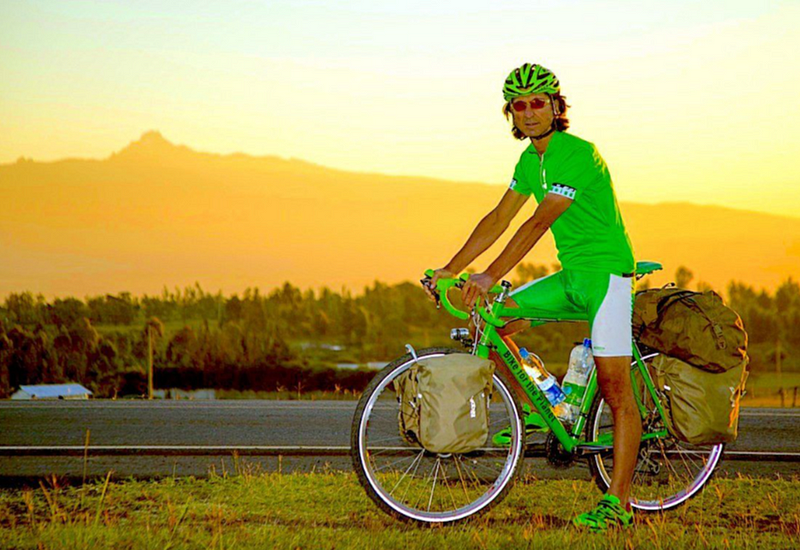Cultivating Hope: A Pathway to Success in Life
Written on
Understanding Hope
Hope is often underestimated and mistaken for mere optimism. However, it plays a crucial role in living a fulfilling life, as it is deeply intertwined with motivation and self-efficacy.
Michael's Inspiring Journey
Meet Michael Evertz, a 64-year-old climate activist whose journey is both tragic and comedic. He gained some recognition by biking thousands of miles across Africa, promoting the message: "Collaboration is the Mother of Surviving."

Through his initiative, Expedition Hope, he aims to traverse 30 countries in 800 days, starting from Berlin, Germany, and concluding at the Cape of Good Hope in South Africa. Along the way, he navigated the Arabian Desert to participate in the COP 28 climate conference in Dubai in November 2023.
Unfortunately, Michael faced a series of misfortunes, including extreme temperatures during the hottest summer on record, a sandstorm that destroyed his tent, and a near-fatal accident involving a truck. Despite these challenges, including theft of his belongings in Cairo, Michael remains determined to continue his journey.

His resilience raises an important question: Where does he find hope?
The Essence of Hope
Hope represents the belief that the future can improve, and that we possess the ability to shape that future. It fosters a proactive and growth-oriented mindset. While optimism can enhance hopeful thinking, it is not a prerequisite.
Positive psychologist Charles Richard Snyder, the pioneer of hope theory, found that higher levels of hope correlate with improved outcomes in mental and physical health, relationships, careers, and more. Those who embody hope tend to live longer, embrace their imperfections, and tackle challenges head-on.
Remarkably, hopeful thinking is a better predictor of success than intelligence or previous experiences. The encouraging news is that hope is not an innate quality but a skill that can be developed.
Three Key Components of Hope
To cultivate hope, Snyder identified three essential components:
- Goals: Establishing meaningful goals is vital. These can vary from significant life ambitions to everyday achievements.
- Pathways: This refers to the strategies we devise to meet our goals. When faced with obstacles, hopeful individuals adapt and find alternative routes to success.
- Agency: This is the drive to remain motivated in pursuing goals, believing that our efforts will yield positive results.
Agency is closely linked to motivation, which can arise from various needs, such as autonomy, mastery, and purpose.
Michael's Motivation
As an activist, Michael has found purpose through his cause. Purpose serves as a powerful motivator and a long-term goal that fosters hope. While he may not have anticipated specific challenges, he prepared for obstacles along the way.
Cycling, which he enjoys, not only provides him with physical stamina but also has been shown to enhance mood and reduce anxiety, contributing to a sense of hope.
Despite the solitary nature of activism, Michael also connects with others at climate conferences, which fosters a sense of belonging and further fuels his motivation.
Radical Hopers
"Radical hopers refuse to accept the current bleak prospects," states Ocean us, a foundation dedicated to marine conservation. They believe that hope stems from wisdom and love for the oceans.
Learning to Hope
Hope is a skill that can be cultivated throughout life. The earlier we start, the better, but it’s never too late to learn. Embracing a growth mindset—believing in our capacity to improve—is crucial.
To nurture hope, consider these steps:
- Set meaningful and challenging goals.
- Visualize your path to success.
- Anticipate challenges and develop backup plans.
- Seek knowledge and practice until you achieve expertise.
- Persevere, even in tough times.
- Build a supportive community.
- Use humor to lighten the load.
In college, during late-night study sessions, my group would encourage each other by saying, "Fear not. It can be done." This light-hearted affirmation reminded us that we owned our tasks and believed in our ability to succeed.
Conclusion
Hope embodies the belief that we can create a brighter future. It is a mindset that counters apathy, fueled by motivation and self-efficacy. To endure setbacks like Michael, we must honor our goals and trust in our capabilities.
This video titled "Hope as the Antidote" explores how psychologists can foster hope in their lives and communities, emphasizing the transformative power of hope.
In "What Defines A Successful Hope Carrier?" discover the characteristics and strategies of individuals who effectively embody and promote hope in their endeavors.